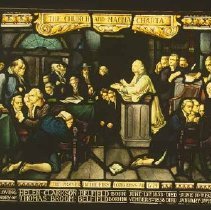Patriots, Loyalists, Anglicans: unity and accord

I continued, as did all of us, to pray for the king, until Sunday (inclusively) before the 4th of July 1776. So said William White , supporter of the Patriot cause and chaplain to the Continental Congress. It is a reminder of the complexities and nuances of Anglican allegiances and identities in North America during these years. Similarly we might also point to the Loyalist parson Jonathan Boucher's critique of the Administration in Westminster in a 1774 sermon: Their whole conduct, indeed, has been so utterly devoid of counsel, that I seem to have no right to tax those persons with being superstitious, who ascribe to it a preternatural infatuation ... That they wish for a reconciliation, we cannot but believe: yet every step they have taken, since the dispute began, has, through their folly, or our perverseness, or both, tended only to widen the breach; tended to make new enemies and lose old friends. Boucher also admitted, in his farewell sermon the following year to his parish i...










